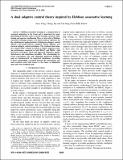A dual adaptive control theory inspired by Hebbian associative learning
Author(s)
Feng, Jun-e; Tin, Chung; Poon, Chi-Sang
DownloadFeng-2009-A dual adaptive control theory inspired by Hebbian associative learning.pdf (797.5Kb)
PUBLISHER_POLICY
Publisher Policy
Article is made available in accordance with the publisher's policy and may be subject to US copyright law. Please refer to the publisher's site for terms of use.
Terms of use
Metadata
Show full item recordAbstract
Hebbian associative learning is a common form of neuronal adaptation in the brain and is important for many physiological functions such as motor learning, classical conditioning and operant conditioning. Here we show that a Hebbian associative learning synapse is an ideal neuronal substrate for the simultaneous implementation of high-gain adaptive control (HGAC) and model-reference adaptive control (MRAC), two classical adaptive control paradigms. The resultant dual adaptive control (DAC) scheme is shown to achieve superior tracking performance compared to both HGAC and MRAC, with increased convergence speed and improved robustness against disturbances and adaptation instability. The relationships between convergence rate and adaptation gain/error feedback gain are demonstrated via numerical simulations. According to these relationships, a tradeoff between the convergence rate and overshoot exists with respect to the choice of adaptation gain and error feedback gain.
Date issued
2010-01Department
Harvard University--MIT Division of Health Sciences and Technology; Massachusetts Institute of Technology. Department of Mechanical EngineeringJournal
Proceedings of the 48th IEEE Conference on Decision and Control, 2009 held jointly with the 2009 28th Chinese Control Conference. CDC/CCC 2009
Publisher
Institute of Electrical and Electronics Engineers
Citation
Jun-e Feng, Chung Tin, and Chi-Sang Poon. “A dual adaptive control theory inspired by Hebbian associative learning.” Decision and Control, 2009 held jointly with the 2009 28th Chinese Control Conference. CDC/CCC 2009. Proceedings of the 48th IEEE Conference on. 2009. 4505-4510. © 2010 Institute of Electrical and Electronics Engineers.
Version: Final published version
Other identifiers
INSPEC Accession Number: 11148353
ISBN
978-1-4244-3871-6
ISSN
0191-2216